Create positive contributions, promote well-being and engagement to the communities in which we operate through basic services
At B.Grimm Power, we hold a profound sense of responsibility towards preventing and controlling any potential impact from our operations on the communities and environment in which we operate. We take pride in being a contributor to promoting robust and sustainable growth within these communities. Therefore, we are fully committed to engaging in projects that generate a positive impact on society, the environment, and the community around each power plant. Our focus is on projects that align with the unique context of each operating area, such as the B.Grimm Boworn Project (which encompasses the House, Temple, and School), the Sustainable Cultivation Centre at Xenamnoy and Xekatam in Lao People's Democratic Republic, the community water supply construction project for the people of Ban Nam Tuad in Muang Pak Chong, Champasak Province, and the community prototype of sustainable energy project. Additionally, we have initiated the B.Grimm Nature Farming Project, which promotes natural farming methods in conjunction with the B.Grimm Power Plant. The details of these outstanding projects are as follows:
B.Grimm Boworn
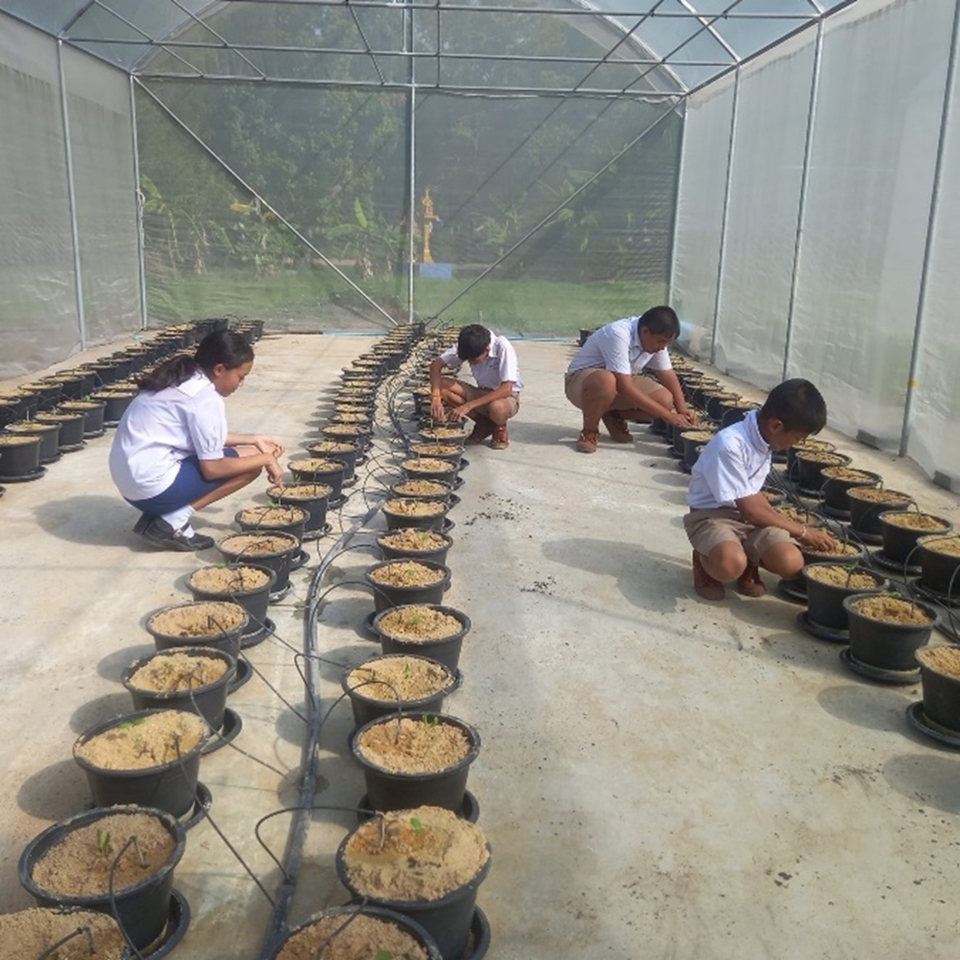
B.Grimm Boworn (House, Temple, School) project, initiated on October 18, 2020, at B.Grimm Village (Moo 8), Klong Thap Chan Sub-District, Aranyaprathet District, Sa Kaeo Province, represents a significant effort towards driving the development of the community and society, promoting real potential and sustainability. The project aims to elevate the community in all aspects of the economy, society, environment, and people, while aligning them with the Royal Initiatives of "House, Temple, School" and the Sufficiency Economy of H.M. the late King Rama IX. The goal is to instill the community’s love for its homeland, enabling a strong community with income, happiness, and balance in life. The engagement process, coupled with mutual learning exchange between the community, temple, and school, is the foundation of this project
In 2022, B.Grimm Power collaborated with the Mechai Viravaidya Foundation to expand the project's reach and impact via various activities that enable everyone to participate in strengthening the community, improving education and the quality of life for students and community members. The Joint Development School Project model centers on the school as a hub for community development, facilitating long-term planning. Nine activities were identified, including 1. Participation in and strengthening the community, 2. Training for the development of teachers, students, and community members, 3. Establishment of poverty reduction agricultural plots, 4. Establishment of savings funds and occupational loans, 5. Equipment and learning materials support, 6. Food security and income for the elderly, 7. Health, environment, and tree-planting support, 8. Management, follow- up, and giving advice, and 9. Evaluation of the project.
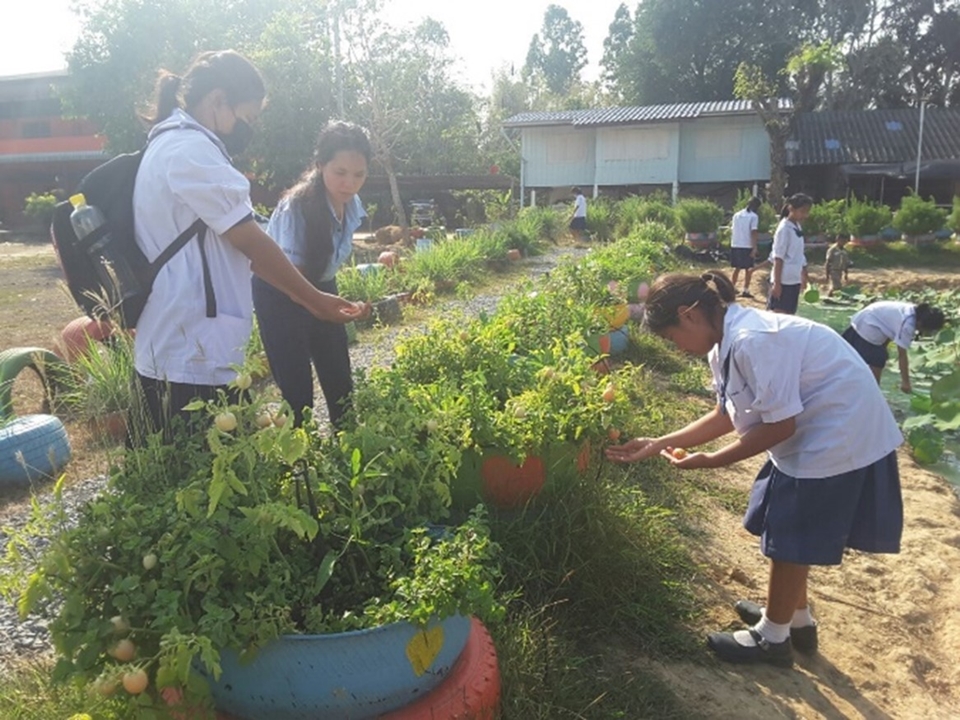
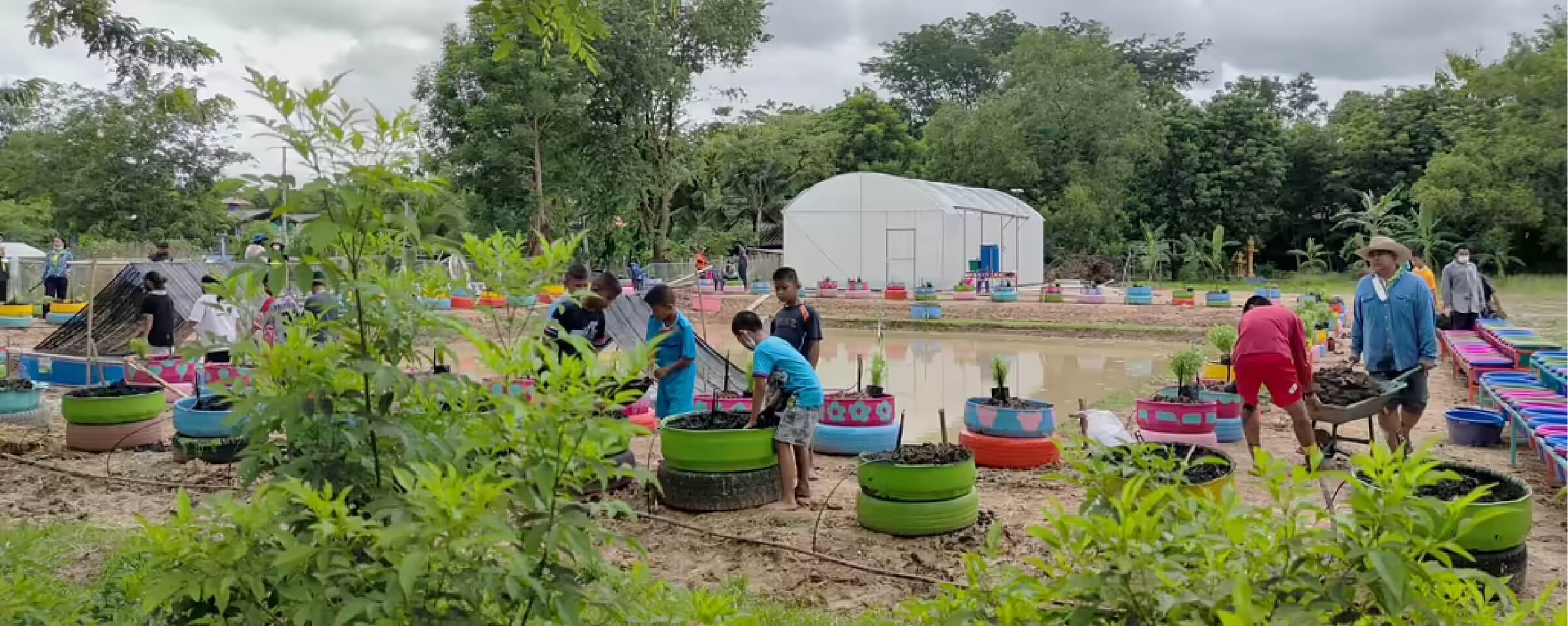
Furthermore, a pilot activity called "Establishing Agricultural Plots to Eradicate Poverty" was conducted on the land of B.Grimm School, where teachers, students, village headmen, the abbot of B.Grimm Temple, and villagers participated in establishing melon and grape farms, installing a solar-cell water system in the school, and training on rice-milling machines and sealing of agricultural products, among other activities. The results of this activity are expected to improve the quality of life for the community and generate more income for schools and communities, thus making B.Grimm School the first agricultural learning centre for melon and grape farms in Sa Kaeo Province. In addition, B.Grimm and the Joint Development School Project organised training sessions on how to set up savings and loan funds for various occupations, such as the career fund for the parents and community as a source of low-interest funding for people in the community to invest in careers and the student business fund to promote vocational training and revenue whilst studying.
In 2023, we continued to enhance vocational skills and quality of life for schools and community members consistently. Our outstanding achievements include agricultural transformations aimed at alleviating poverty, generating income exceeding 62,000 Baht from various activities. These initiatives involved:
- Watermelon Cultivation: Setting up three watermelon greenhouses and conducting six cultivation cycles, yielding approximately 100 to 250 watermelons per cycle per greenhouse.
- Aquaponic Vegetable Farming: Schools cultivated various vegetables such as water spinach, eggplant, gourd, morning glory, Chinese celery, and lotus flowers using diverse methods including pond cultivation, basket cultivation, car tire cultivation, and table cultivation. These vegetables were then sold within the community.
- Livestock Farming: This included fish farming, frog farming, and poultry farming (chickens and ducks).
These efforts have transformed B.Grimm schools into educational hubs for watermelon cultivation, agriculture, and other related activities. Additionally, B.Grimm schools have acted as mentor schools for the development projects of the Meechai Viravaidya Foundation for schools from Cambodia, such as the Santi Piap School and the Samakki Mia School.
Business Benefit Indicators
- Show the ambition to contribute positive impact to the society following our philosophy in “Doing business with compassion for the Development of Civilisation in Harmony with Nature” together with solve problems, and support the essentials to improve the well-being and bring happiness to everyone.
- Align with a goal of B.Grimm Power’s sustainability strategy of making positive impact on the community, society, and the environment everywhere the Company operates.
- Reduce conflicts and complaints from the community around the power plant.
(In 2022, the number of complaints and conflicts around the power plant was zero.)
Social Benefit Indicators
- Increase the number of local people around the school, including teachers and students who have been developed in know-how and knowledge in professional skills in agriculture, environment management, cooking, and fund creation such as melon, grape and mushroom cultivation, food processing, baking, and Thai desserts.
- Increase the number of agricultural glasshouses in the school and community.
(Since the start of the project in 2022, a total of 3 watermelon greenhouses have been established.) - Promote the establishment of the fund as a source of low-interest financing and promote savings for parents of students.
(In 2023, the fund had more than 56 members with a total deposit of 128,500 Baht throughout the year and a loan amount of 100,000 Baht.) - Promote the establishment of a student business fund as a source of low-interest financing and to promote savings and enhance occupational building investment experience.
(In 2023, student-run businesses were established in four categories: fish farming and selling, coffee shops, bakeries, and glass screen printing businesses.) - Support and align with SDGs in sub-goals 1.1, 1.2, 2.1, 2.3, and 8.31.
Sustainable Cultivation Centre at Xenamnoi and Xekatam Hydro Power Plant in Laos
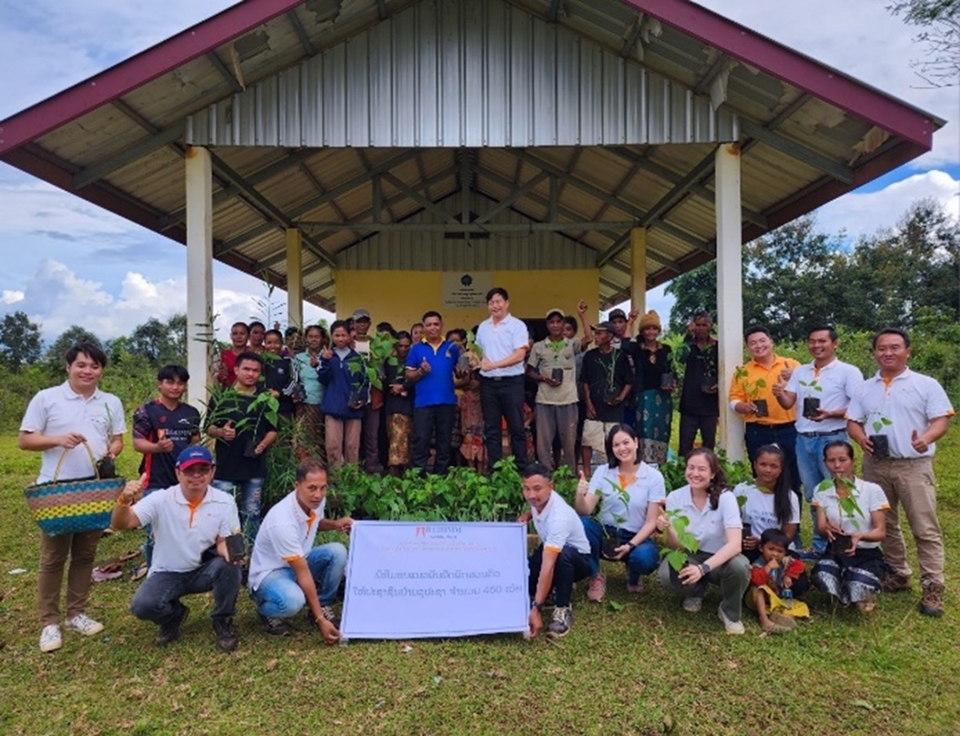
Because food safety is a priority for all, B.Grimm Power has established a sustainable cultivation centre at the Xenamnoy and Xekatam Hydro Power Plants in Paksong, Champasak, Laos, to provide organic farming know-how to local residents and help improve their quality of life. It also educates them about water stewardship and the negative consequences of slash-and-burn agriculture on the topsoil to protect a vital mineral source for organic farming. The centre’s teaching includes vegetable gardening and fertiliser making from liquid compost and aerobic decomposition, aiming to reduce the use of chemicals to protect soil, water, and forested land.
In addition, we encouraged farmers to switch to solar pumps to reduce their energy consumption and electricity-related expenses. We also organised activities to promote learning and instil environmental conservation awareness. For instance, we educated the local children about the methods of agriculture that harm the environment. We distributed vegetable seedlings to villagers to support their livelihood and lower the seed procurement costs, taught them how to make organic fertiliser from aerobic decomposition. We also encouraged exchanges on upland rice farming and served as a piloting centre for local communities.
In 2023, we collaborated with the Faculty of Agriculture and Forestry, Jampha Sak (CPKU), to provide training and knowledge exchange in agriculture for the community, students, teachers, and interested individuals. CPKU developed a basic teaching plan for practical fieldwork in sustainable agriculture promotion centers in Xenamnoi and Xekatam, comprising 2 key activities:
- Compost Making, Biodynamic Fertiliser Production, and Soil Composting for Vegetable Cultivation.
- Cultivation of Leafy Vegetables and Climbing Plants.
Additionally, the center supported the distribution of tree seedlings and vegetable seedlings, including chili, eggplant, ginger, lemongrass, totaling 450 plants, to communities surrounding the power plants. They also conducted surveys in three target villages, in collaboration with CPKU, to gather data and assess agricultural production capabilities (crop cultivation and animal husbandry). Moreover, various training activities were organised for the residents of these 3 villages:
- Livestock farming and veterinary training for residents of Nong Twang Village.
- Coffee cultivation, pest control, and crop protection training for residents of Upachar Village.
- Soil improvement training (biodynamic fertiliser production) for residents of Nam Twat Village.
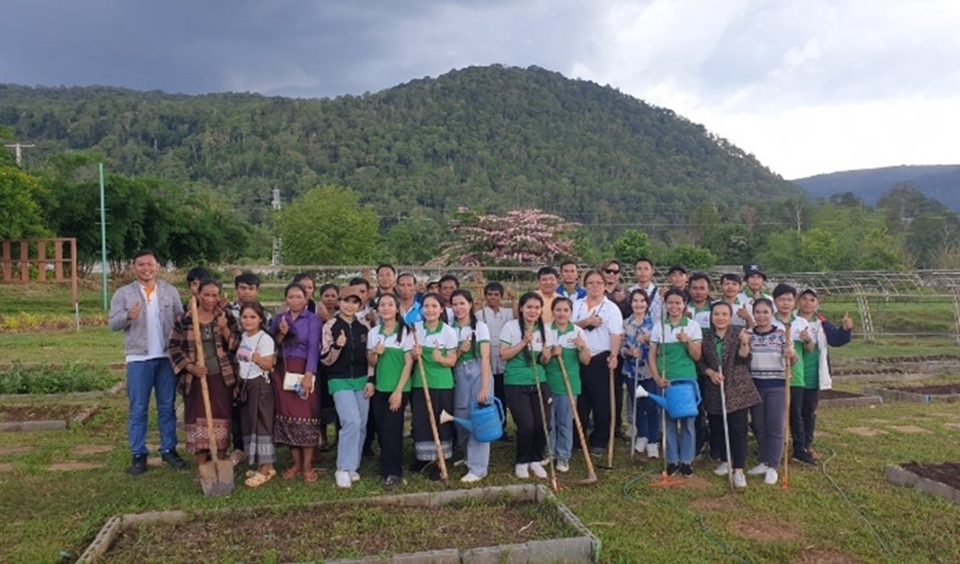
Business Benefit Indicators
- Show the ambition to contribute positive impact to the society following our philosophy in “Doing business with compassion for the Development of Civilisation in Harmony with Nature” together with solve problems, and support the essentials to improve the well-being and bring happiness to everyone.
- Align with one of the goals of the sustainability strategy of the company, which is to Create positive contributions to the communities in which we operate through basic services.
- Reduce conflicts and complaints from the surrounding communities related to the power plant.
Social Benefit Indicators
- Increase opportunities for rural communities to access modern and affordable clean energy sources.
- Increase the number of communities surrounding the power plants that have received training at the Sustainable Agriculture Learning Centre in Xenamnoi and Xekatam. ( In 2023, training sessions were conducted for a total of 263 individuals, including community members, students, and teachers.)
- Support and align with the Sustainable Development Goals (SDGs) target 2.4.
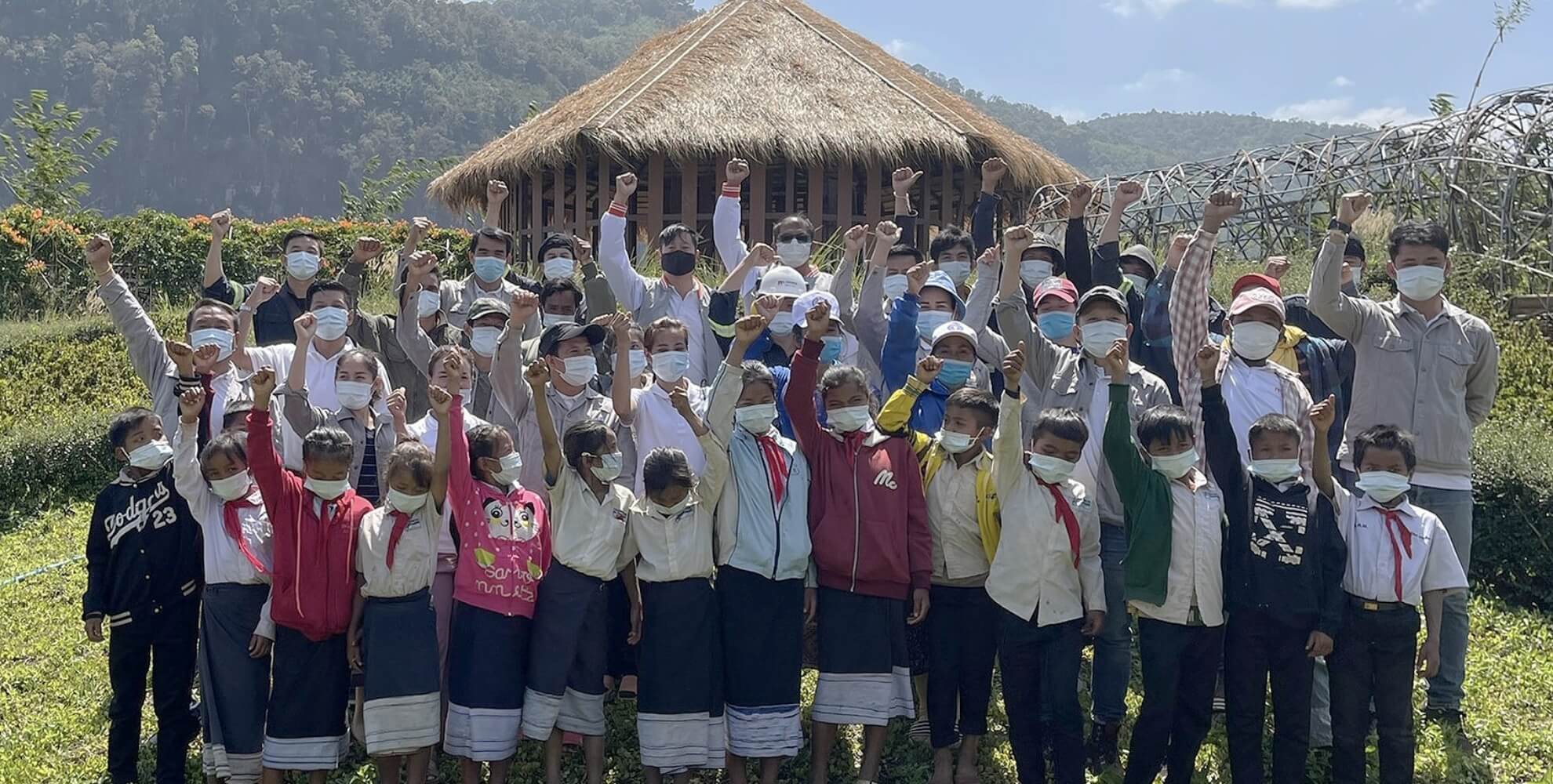
Community Water Supply Project in Laos
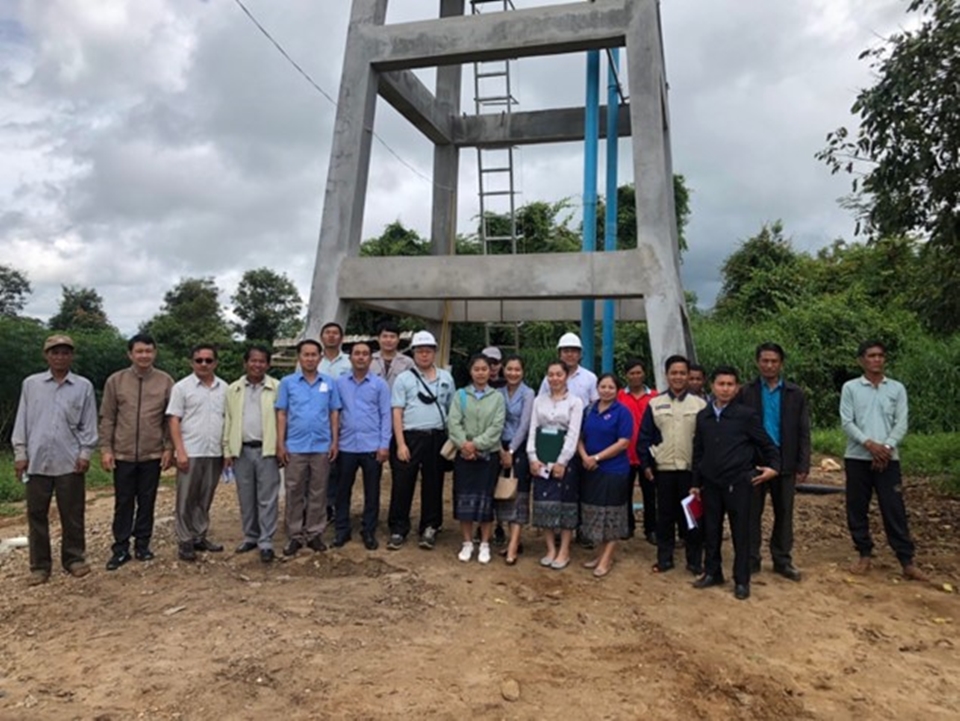
The community water supply construction project for the people of Ban Nam Tuad, Muang Pak Chong, Champasak Province, is another project that arose from the results of the survey of community needs. By inquiring about needs through organising a meeting with the Community Development Fund Protection Committee, it was found that the community and villagers in upper and lowland water areas lacked clean water for use in daily life. B.Grimm Power and the Board recognise that the shortage of clean water will affect livelihood, occupation, as well as causing potential diseases. In 2022, a community water supply system was installed for such community, with about 45 households benefiting from it.


